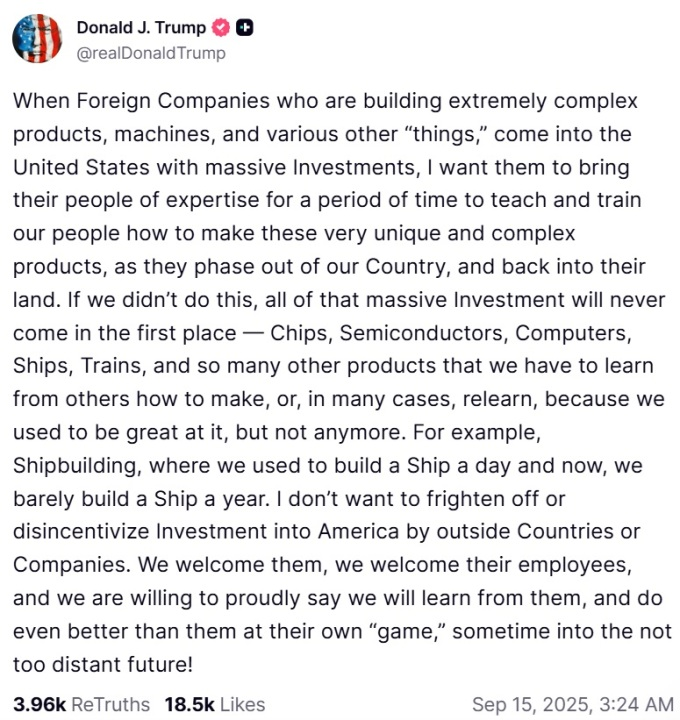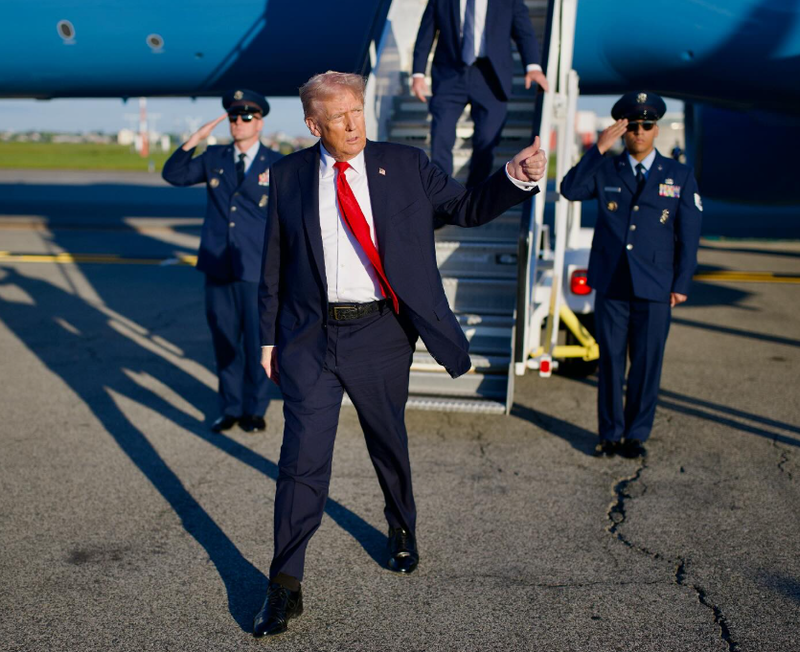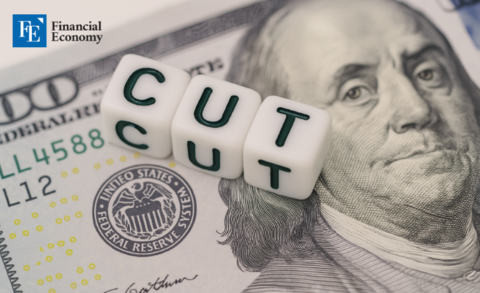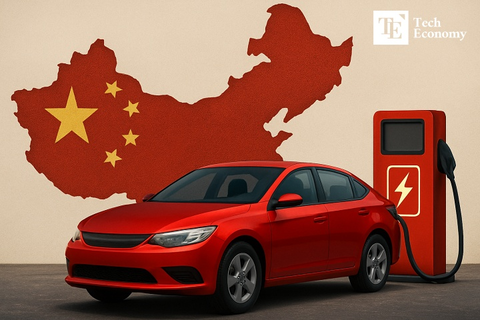Trump, Seeking to Revive U.S. Manufacturing, Appeals to Korea: “Teach and Train Americans”
Input
Changed
Trump: “Teach and train Americans” Move aimed at preventing investment pullback after Korean worker detentions Crackdown at Hyundai site seen as own goal for U.S. battery technology self-reliance

President Donald Trump declared that he does not want to see foreign investment into the U.S. weaken, stressing the need for skilled foreign professionals to remain in the country and train Americans. His remarks were widely interpreted as reflecting the Georgia detention episode, implicitly recognizing that without foreign specialists the revival of America’s manufacturing base would be unattainable, while simultaneously signaling to investors from Korea and other countries that the U.S. would guarantee the presence of essential technical personnel.
Trump, acknowledging America’s shortage of expertise
On the 14th, President Trump wrote on his social media platform Truth Social: “When foreign companies that manufacture highly complex products and machinery make massive investments in America, I want them to bring their experts so they can teach and train our people.” He called on foreign investors to station experts in the U.S. for a period of time to train American workers before gradually withdrawing. Trump warned, “Otherwise, all of those large-scale investments would never have been made to begin with.”
He added: “We must learn from others how to produce semiconductors, computers, ships, and many other products. We were once great at this, but no longer—especially in shipbuilding.” Trump emphasized: “For example, in the past we could build a ship a day, but now we can barely manage one a year.” He concluded: “We do not want foreign countries or companies to fear or hesitate to invest in America. We welcome them and their workers, and we are willing to proudly say that we will learn from them.” In this way, he suggested, the U.S. would soon be able to surpass them.
Earlier, on the 7th, Trump had posted on Truth Social: “We encourage you to bring in people with exceptional technical talent, very smart individuals, legally, to produce world-class products. And we will ensure that you can do so swiftly and legally.” On the same day, he told reporters: “If this country has no one who understands batteries, then we must help bring in some experts so that our workforce can be trained—whether in battery manufacturing, computer production, or shipbuilding—so they can perform complex tasks. We must devise a plan to bring in specialists to train our people until Americans can do it themselves.”

President Lee: “They lack skilled workers”
Although Trump refrained from naming specific nations or firms, his statements appeared directed at the September 4 operation by U.S. immigration authorities, who detained 475 workers—including 317 Koreans—at the Hyundai Motor–LG Energy Solution joint battery plant site in Georgia. The Koreans were released about a week later, but reports that some detainees held valid visas triggered criticism that heavy-handed enforcement conflicted with Washington’s policy of attracting foreign investment.
President Lee Jae-myung voiced concern: “From the standpoint of our companies, establishing plants in the U.S. will inevitably entail disadvantages and difficulties. It could have a significant impact on direct investment going forward.” He added: “Technicians are essential for installing machinery and equipment. Yet the U.S., lacking such skilled personnel, refuses to issue visas for our people to stay and work.”
Six-Month Training for Assistants, Unrealism of U.S. Workforce Training
Industry officials expect the Hyundai plant’s construction to be delayed by at least two to three months. On September 12, LG Energy Solution CEO Kim Dong-myung returned to Korea with the released workers and said the delays were “manageable.” Yet observers warn that restarting construction will take considerable time, as replacing more than 300 absent workers immediately is virtually impossible.
While the Trump administration has pressed for hiring Americans, industry insiders note that training takes years. “Even to train an assistant pipefitter takes more than six months,” said a battery industry executive. “For batteries or semiconductors, America has no workforce capable of equipment maintenance or installation. Skilled tradesmen essential at these sites require five to six years of experience. When exactly will they be trained and ready?”
There is also a stark cultural gap regarding factory labor. A semiconductor industry official said: “Americans view battery and semiconductor plant work itself as undesirable ‘3D jobs.’ Even if we want to train them, it is difficult to find people willing to learn.” Hyundai Motor Global President and COO José Muñoz similarly stressed: “The construction stage of a plant requires specialized expertise, but in the U.S. many such skills and equipment are simply unavailable.” Analysts conclude that without a resolution to the visa issue, restarting U.S. plant construction will remain difficult.
The Wall Street Journal, in a September 11 editorial, acknowledged: “Americans may find President Lee’s words uncomfortable, but they are true. The U.S. lacks the workforce capable of performing such tasks.” It warned that “the immigration raid at the Georgia site works against the very foreign investment President Trump seeks.”
Foreign Policy magazine was equally blunt, calling the episode an “own goal.” Citing President Lee’s remark that Korean companies would “hesitate greatly” before investing further in the U.S., the magazine described it as a warning to Washington. It argued that “the raid ignited a diplomatic flashpoint with a longtime ally and drew attention to the state of America’s battery sector.” The article noted: “U.S. industry remains heavily reliant on foreign technology for growth. The Hyundai case has revealed the true condition of U.S. battery manufacturing.” It added: “Korea, in particular, is a global powerhouse. Korean firms lead in overseas battery production capacity, and last year alone supplied more than 20% of global EV battery demand.”






















Comment